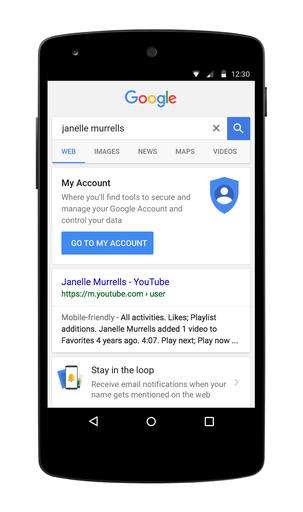Googling yourself now leads to personal privacy controls

Soon, all you'll need to do is Google yourself if you're wondering how deeply Google has been digging into your digital life.
In coming weeks, a shortcut to personal account information will appear at the top of Google's search results whenever logged-in users enter their own names in the query box.
The feature is part of an update to the "My Account" hub that Google introduced a year ago to make it easier for people to manage the privacy and security controls on the internet company's services. While Google isn't making any additional information available, it is making it easier to find.
The link to personal accounts will appear at the top right of the listings for searches done on personal computers and at the top of requests entered on smartphones.
Google is making the change because it learned that many users doing a "vanity search" under their name wanted a quicker way to find out what the company knew about them, as well as to see how they are depicted on various sites across the internet, said Guemmy Kim, a Google product manager.
A new feature on Google's mobile app will also quickly take users to their account information with a spoken request. All that will be required are the words: "OK Google, show me my Google account." This option initially will only be available in English.
People have become more interested in managing their digital profiles as a confluence of search engines, smartphones and online social networks makes it easier to track where they are, what they're doing and what they're thinking. Revelations about government agencies' online surveillance programs also has heightened interest in privacy protection.
Google uses the data collected by its search engine, Gmail and other services to analyze people's interests and habits to show them ads about products most likely to appeal to them. Those ads generated $67 billion in revenue last year, providing most of the money that fuels Google's parent company, Alphabet Inc.
In addition to providing quicker ways to get to personal account information, Google also is introducing a "Find Your Phone" tool that's designed to protect data stored on a device, as well as help locate it if it's lost or stolen. The tool will work on Apple's iPhone, as well as devices running on Google's Android software. It's meant to supplement the device-tracking and security features already built into the iPhone and the Android operating system.
© 2016 The Associated Press. All rights reserved.



















